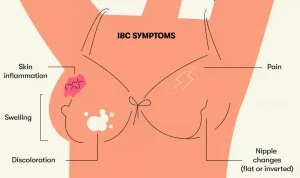Overview
Inflammatory breast cancer (IBC) is a rare and aggressive form of breast cancer that causes rapid inflammation, swelling, and redness of the breast. Unlike other types of breast cancer, it often does not form a distinct lump and can progress quickly over weeks or months. IBC occurs when cancer cells block lymph vessels in the skin of the breast, leading to characteristic inflammatory changes. Early diagnosis and prompt treatment are critical due to its aggressive nature.
Symptoms
-
Redness covering a large portion of the breast
-
Swelling or enlargement of the breast
-
Warmth and tenderness of the affected breast
-
Skin thickening or pitting resembling an orange peel (peau d’orange)
-
Flattening or inversion of the nipple
-
Breast pain or itching
-
Rapid changes in breast appearance
Causes
The exact cause of inflammatory breast cancer is unknown. It develops when breast cancer cells spread to and block lymphatic vessels in the skin, causing inflammation-like symptoms. Contributing factors may include:
-
Genetic mutations affecting cell growth
-
Abnormal cell division in breast tissue
-
Hormonal influences
Risk factors
-
Female gender
-
Younger age compared to other breast cancers
-
Obesity
-
African or African-American ethnicity
-
Family history of breast cancer
Complications
-
Rapid spread to nearby lymph nodes
-
Metastasis to distant organs such as lungs, liver, or bones
-
Difficulty achieving early diagnosis due to lack of a lump
-
Emotional and psychological distress
-
Reduced survival rate compared to other breast cancer types
Prevention
There is no guaranteed way to prevent inflammatory breast cancer, but steps to reduce overall breast cancer risk include:
-
Maintaining a healthy body weight
-
Regular physical activity
-
Limiting alcohol intake
-
Prompt medical evaluation of sudden breast changes
-
Adhering to recommended breast screening guidelines
Because inflammatory breast cancer progresses rapidly, any sudden changes in breast appearance or skin texture should be evaluated by a healthcare professional without delay.
Advertisement

